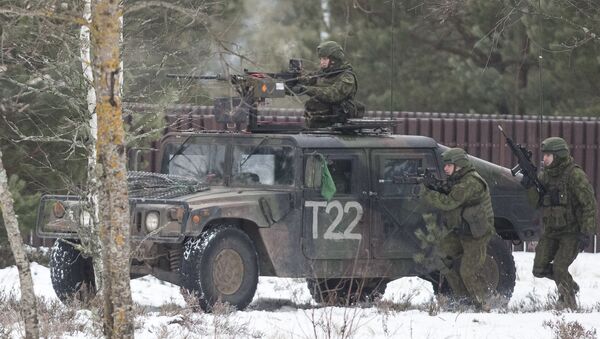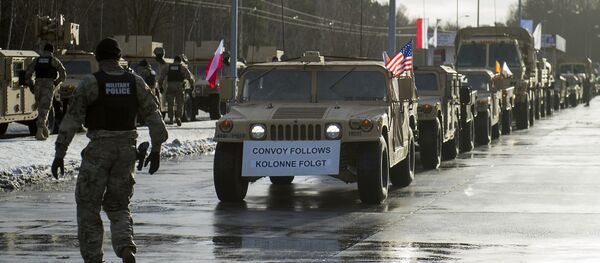WASHINGTON (Sputnik) — Outgoing US President Barack Obama’s decision to send 3,500 more American troops and hundreds of tanks and other military equipment to Eastern and Central Europe announced this week allegedly to counter "Russian aggression" will escalate an already dangerous and unnecessary war scare, analysts told Sputnik.
"The real question is precisely what 'aggression' all this military buildup is trying to deter," University of Copenhagen Professor of History Matthew Dal Santo said. "The present war scare in the Baltics is a dangerous and irresponsible invention."
Far from deterring Russia, Obama’s decision was certain to alarm its policymakers as it would deploy additional US forces within striking distance of Russia’s second largest city, Dal Santo pointed out.
"Nothing is more likely to antagonize Russia than the deployment of US forces within artillery range of its second capital, St. Petersburg," he noted.
US officials needed to visualize what their reactions would have been if Russia had carried out similar s deployments in neighboring nations, Dal Santo suggested.
"Were Moscow to carry out a similar deployment of Russian forces to Cuba or Mexico, Washington would have no trouble identifying it as an aggressive act," he noted.
Dal Santo interpreted the move as an attempt by Obama, the outgoing US leader to lock his successor, President-elect Donald Trump, into following the same policies of brinkmanship and escalation that he had indulged in. Trump is scheduled to take office on January 20.
"Once again, Obama is trying to tie Trump's hands," he said.
"My sense is that Trump won't allow himself to be constrained in this way and the new deployment of US soldiers may not even reach the Baltics before they're called home," he said.
Retired US Army Colonel Doug Macgregor, a historian and leading US military tactician, said Obama’s deployment was politically motivated, but involved too few troops and tanks to be significant in any way in military terms.
"This is a gesture designed to reassure the people of the Baltic Littoral and Poland that the United States and NATO remain committed to them. As the STAVKA [Russian General Staff] knows, it’s otherwise meaningless," he said.
Obama and his top generals had not begun to provide the necessary command and logistical infrastructures necessary to support any serious military operations in Eastern Europe, Macgregor pointed out.
"Without a meaningful command and control structure in place, supporting logistical infrastructure and new formations with new equipment designed for 21st Century warfare, it’s a gesture, nothing more," he said.
Doug Macgregor, a Ph.D. in international relations from the University of Virginia, commanded the Battle of 73 Easting, a decisive tank fight during the 1991 Gulf War.




